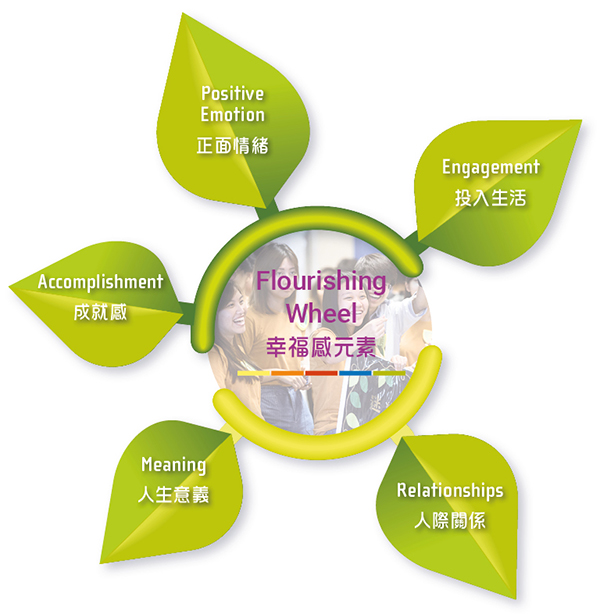
The meaning of life is to give life meaning
By : Mirror Fung
Dr Sylvia Kwok Lai Yuk-ching from the Department of Social and Behavioural Sciences once met an elite student who seemed troubled by the meaning of life.
“Sandy, a pseudonym, set high standards for herself and constantly felt stressed. She believed her self-worth was built on winning and receiving others’ appreciation,” says Dr Kwok. “She raised the questions, ‘Why do I need to meet others’ expectation? What is the meaning of life?’”
 Dr Sylvia Kwok Lai Yuk-ching In the past ten years, Dr Kwok has launched several positive education projects in kindergartens, primary and secondary schools, and social welfare agencies aimed at preventing mental health problems and promoting well-being.
Dr Sylvia Kwok Lai Yuk-ching In the past ten years, Dr Kwok has launched several positive education projects in kindergartens, primary and secondary schools, and social welfare agencies aimed at preventing mental health problems and promoting well-being.
She strongly believes, as Dr Viktor E. Frankl wrote in his 1946 book Man’s Search for Meaning, that the “meaning of life is to give life meaning”.
“We hope to promote positive education and foster the holistic development of university students through the Joint University Mental-wellness Project [JUMP], which I helped to set up a few years ago, combining the efforts of several experts from local universities,” says Dr Kwok. She is the principal investigator on JUMP and the regional representative for the Positive Education Division of the International Positive Psychology Association.
“We adopt a positive transformational learning pedagogy, integrating ‘positive education’ and ‘transformational learning’.”The JUMP project aims to enhance university students’ well-being, increase their resilience to face adversities and challenges, and encourage them to contribute to society. The team employs a strength-based and process-oriented approach to maximise students’ potential and capacity, ultimately helping them to become more analytical, reflective, and socially responsible citizens.
“We adopt a positive transformational learning pedagogy, integrating ‘positive education’ and ‘transformational learning’,” she says. Through a 6-step transformational learning pedagogy, that is, to learn, live, reflect, conceptualise, apply, and embed, the team has established a positive culture in universities and the community.
The second component of positive education content that the team has adopted is the five elements critical for long-term well-being—positive emotions, positive engagement, positive relationships, positive meaning, and positive accomplishment.
However, positive education not only looks at the positive side to life. “One of our signature workshops is the Negativity Club, where students share their emotions and learn that negative emotions also have a function. They develop a new perspective that a negative emotion is normal, and we should accept both positive and negative feelings,” Dr Kwok explains.
To attract more students, the team has designed creative activities such as interactive workshops, experiential learning camps, a study tour, student-led mental wellness festival, and community projects. In addition, an online international conference and several professional staff training workshops have been launched for staff and professionals in the field of education.
 “The impact of positive education will be more significant when university staff incorporate the concepts and pedagogy in their teaching and daily interactions with the students. Therefore, a key feature of the project is the variety of creative activities designed for both the staff and students,” Dr Kwok adds.
“The impact of positive education will be more significant when university staff incorporate the concepts and pedagogy in their teaching and daily interactions with the students. Therefore, a key feature of the project is the variety of creative activities designed for both the staff and students,” Dr Kwok adds.
The project has benefitted over 1,100 staff and professionals, and around 4,000 university students, some of whom conduct their own community projects, benefitting around 1,500 people in the wider community. Examples of these projects include a cookie-baking programme for secondary school students preparing for stressful public exams.
Not long after “Sandy” joined the JUMP workshops and other activities, she discovered her strengths, developed better self-affirmation, and found ways to handle stress.
In fact, the team’s longitudinal survey suggests participants have an increased understanding of meaning in life, knowledge about coping flexibilities, and decreased levels of anxiety and stress after joining the project, which Dr Kwok finds reassuring.
“Together, we can advocate a paradigm shift from the deficit model that focuses on students’ weaknesses to a model that emphasises their strengths,” she says. “Together, we can make a difference.”

Dr Kwok (2nd from right) and the project’s co-investigators: Professor Daniel Wong Fu-keung (1st from left) from The University of Hong Kong, Dr Pan Jiayan (2nd from left) from Hong Kong Baptist University, Ms Lorette Leung Mee-kuen (centre) from The Education University of Hong Kong, and Dr To Siu-ming (1st from right) from The Chinese University of Hong Kong.
 President Way Kuo (left) says Dr Kwok exemplifies the excellence of CityU’s teachers and embodies our focus on student well-being and positive learning. Dr Kwok and her inter-institutional team received the 2021 University Grants Committee Teaching Award in recognition of their contributions to promoting positive education. This is the fifth time that CityU faculty members have won UGC teaching awards since its inception in 2011.
President Way Kuo (left) says Dr Kwok exemplifies the excellence of CityU’s teachers and embodies our focus on student well-being and positive learning. Dr Kwok and her inter-institutional team received the 2021 University Grants Committee Teaching Award in recognition of their contributions to promoting positive education. This is the fifth time that CityU faculty members have won UGC teaching awards since its inception in 2011.
The team will use the award to expand the positive transformational learning model and JUMP’s unique features. It is hoped that this model will be implemented over the long-term in a sustainable manner and that all eight UGC-funded universities will become involved.

